★ Chickens: A Rural Livin’ Icon

Chickens provide eggs, meat, help in the garden by killing pests and can provide an extra stay-at-home income for your homestead.
There is a lot of information on the internet and in books about raising chickens. The information overload may cause one to become a little overwhelmed. I have maintained a small flock of birds most of my life, from a young teen until now, and although I do not claim to be an expert, I do feel pretty confident sharing what I have learnt over the decades to help first-time chicken owners.
Lucky-7 Tips to starting your first flock:
Tip 1. Start with freshly hatched chicks.

There are several ways to get started.
- Buy a young hen, or hens, that are guaranteed, proven layers. A word of caution, you may unknowingly purchase and end up with someone else’s ‘culls’ that are at the end of their laying life. So, use a reputable supplier, ask lots of questions and be careful of what you are buying.
- Pick-up or order by mail-order your first batch of fertilised eggs, incubate them
 and allow them to hatch. Once again, use a reputable breeder/supplier.
and allow them to hatch. Once again, use a reputable breeder/supplier. - Start with a healthy bunch of new-born chicks from a supplier. Chicks are near impossible to sex at a young age, so you may end up with a mixed brood. See if the breeder has a guarantee of any kind.
From an educational perspective, my advice is to start with freshly hatched chicks. While hatching your own chicks from eggs is something you may consider in the future and can be fun, I suggest you become accustomed to the natural progression of a chicken’s health and behavior before taking on the more complex world of egg incubation.
Most local feed stores receive chick orders in the spring, so watch store’ flyers carefully to determine when chick stocks are due in your area. If you do not have access to a shop where you live, then mail-order chicks are an option.
Tip 2. Choose the right breed – a dual-purpose laying breed or meat breed.
 Choose a breed that is known to lay a decent number of eggs but also has adequate meat production just in case you end up with too many roosters down the road or a hen that no longer lays and needs to be culled.
Choose a breed that is known to lay a decent number of eggs but also has adequate meat production just in case you end up with too many roosters down the road or a hen that no longer lays and needs to be culled.
Dual purpose chickens seem to be hardier than other more “specialised” breeds. Depending on your country and region may limit your choices. In the past my favourite breeds have been:
- Rhode Island Reds,
- New Hampshire Reds,
- Barred Rocks,
- Plymouth Rocks,
- Orpingtons, or
- Wyandotte
Tip 3. Keep things simple. You don’t need an extravagant chicken coop.
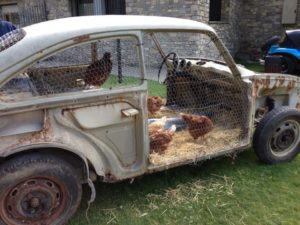 If having a fancy chicken coop is holding you back – don’t let it. People seem to think a chicken coop needs to look as good as or better than their own home, but the truth is chickens do not require 5-star accommodation to function as a happy thriving animal.
If having a fancy chicken coop is holding you back – don’t let it. People seem to think a chicken coop needs to look as good as or better than their own home, but the truth is chickens do not require 5-star accommodation to function as a happy thriving animal.
A few things chickens will require are:
- protection from predators,
- a place to roost,
- nesting boxes ( for layers ), and
- a place to roam.
You can easily meet the needs of your birds is to modifying an existing building ( small barn, shed, or even a doghouse ), or DIY project to build a small chicken tractor.
Tip 4. Keep it simple, stay your chicken environment as natural as possible.
As your interest in chicken rearing grows, you might be tempted with the many gimmicks. There is no need to complicate things with chicken toys and decorations, expensive feeders and waterers. Keep your chicken adventure as simple natural as you can by:
- Utilising the free-range method if possible. This will cut down on your feed bill and provides your chickens with a diet more like nature intended resulting in healthier birds and produce better eggs. A word of caution: know your local predators and protect your flock from them.
- Avoid using commercial chemicals or special “washes” to disinfect your chicken coop, instead use a natural homemade solution ( see recipe below ).
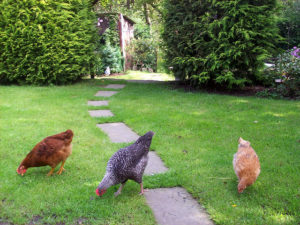 Feed your chickens dried, crushed egg to help supplement their calcium intake.
Feed your chickens dried, crushed egg to help supplement their calcium intake.- Give your chickens as many of your kitchen scraps as is available. This helps to provide your chickens with extra nutrients.
- Provide heat lamps whenever the temperatures drop to low.
- Avoid the expensive equipment at the feed store if you can. DIY as much as you can, so long as the chicken’s health is not at risk.
- I go homemade whenever possible. I’ve avoided purchasing the expensive chicken equipment at the feed store by creating my own feeders from repurposed items. I have also made nesting boxes and roosts from scrap lumber or old pallets.
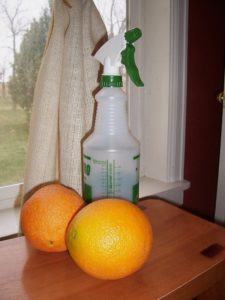 DIY All-Purpose Citrus Cleaner Ingredients
DIY All-Purpose Citrus Cleaner Ingredients
- 1 or 2 quart-sized mason jars
- A spray bottle
- 1-2 quarts of White vinegar
- Orange, grapefruit, lemon or lime peels ( any combination of these will work, too )
Optional
- 3-4 drops of lemon, grapefruit or orange essential oil
Instructions
- Stuff quart jar(s) about half full of citrus peels
- Fill jars the rest of the way up with white vinegar
- Cover tightly with a lid and shake
- Write the date so you don’t forget!
- Store jars with contents for 2-3 weeks ( The longer it sits, the more potent the mixture will become )
- Remove peels and strain through a fine strainer
Dilute
1:1 with water ( one part citrus/vinegar mix to one part water ) and place the solution in a spray bottle.
Optional
- add 3-add 4 drops essential oil to boost it’s cleaning power
- You can also use this on your sinks, countertops, bathtubs, toilets, floors, etc
Tip 5. Establish a routine with your daily chores.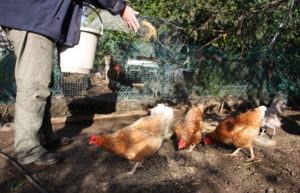
Chickens are quite low maintenance. Running a homestead will require your time at other places with other chores. It’s easy to “forget” about your chickens sometimes. Your homestead will run the smoothest when you establish a daily routine for filling feeders, waterers, freshening the animal’s bedding, and collecting eggs.
Tip 6. It’s important to be proactive. Keep things clean.
Routine is key to this proactivity. Dirty nesting boxes will result in unhealthy birds, dirty eggs which equates to the debatable dilemma of whether or not you should wash your eggs.
It only takes a minute or two to clean boxes and replace bedding, if you do it each day. If you wait until the end of the week or month, you’ll have a much bigger task, plus lots of dirty eggs. The same goes for the floor of your chicken coop.
Tip 7. During the winter, and if you live in colder climates, get a heated water bowl.
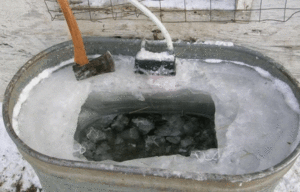 Try not to use non-cost-effective electricity when possible. But on occasion, you will have to generate some heat during birthing season, or in winter for keeping water thawed. When it comes to dealing with your chicken’s drinking water, always keep it clean ( that goes for all livestock ) and use a heated water dish such as a heated dog bowl if available. Shallow animal buckets, pans or containers freeze quickly, and then you’re faced with ill care or having to be outside every couple hours breaking up the ice and refilling containers. During warmer weather, on demand waterers are the best.
Try not to use non-cost-effective electricity when possible. But on occasion, you will have to generate some heat during birthing season, or in winter for keeping water thawed. When it comes to dealing with your chicken’s drinking water, always keep it clean ( that goes for all livestock ) and use a heated water dish such as a heated dog bowl if available. Shallow animal buckets, pans or containers freeze quickly, and then you’re faced with ill care or having to be outside every couple hours breaking up the ice and refilling containers. During warmer weather, on demand waterers are the best.
Conclusion:
 Chickens can be as easy or as complicated as you choose to make it. If you have the time, energy, and finances, then, by all means, build a Victorian-style chicken coop mansion and spoil them with mix gourmet treats. However, if you are a full-time homesteader, mother, wife, community volunteer or have other commitments or limitations, you’ll be looking for ways to become proactive, efficient, and economical. The benefits of having chickens on your property outweigh the limited work and inconvenience.
Chickens can be as easy or as complicated as you choose to make it. If you have the time, energy, and finances, then, by all means, build a Victorian-style chicken coop mansion and spoil them with mix gourmet treats. However, if you are a full-time homesteader, mother, wife, community volunteer or have other commitments or limitations, you’ll be looking for ways to become proactive, efficient, and economical. The benefits of having chickens on your property outweigh the limited work and inconvenience.